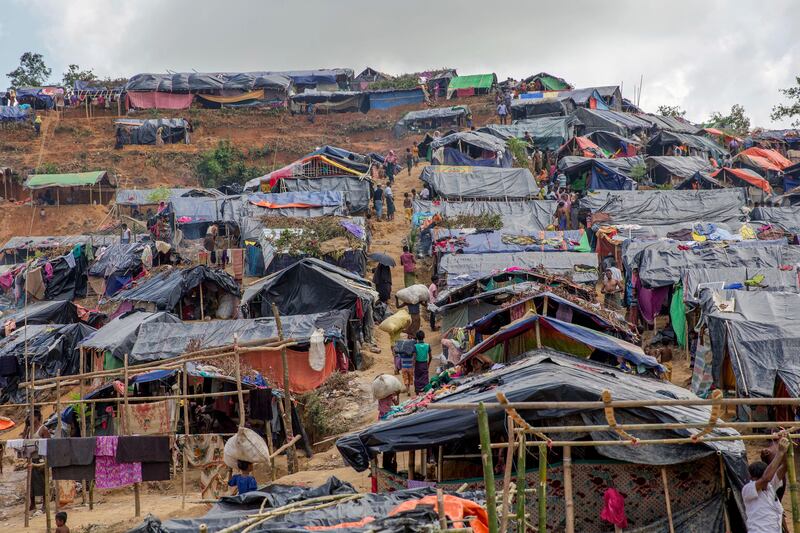Myanmar's army chief on Saturday blamed Rohinyga militants for an explosion outside a mosque in Rakhine state, as a human rights group accused the military of starting fires in the region to prevent refugees from returning.
The unrest comes days after Myanmar's civilian leader Aung San Suu Kyi declared troops had ceased "clearance operations" in the border. Such operations have forced more than 430,000 Rohingya refugees to flee to Bangladesh in under a month.
The army claims it is targeting Rohingya militants who attacked police posts on August 25. But its operation has been so sweeping and brutal that the United Nations says it almost certainly amounts to "ethnic cleansing" of the Rohingya Muslim minority, a group reviled by many in the mainly Buddhist country.
On Saturday Myanmar's commander-in-chief Min Aung Hlaing posted a statement on Facebook saying Rohingya militants planted a "home-made mine" that exploded in between a mosque and madrasa in northern Rakhine's Buthidaung township on Friday.
The army chief accused the militants of trying to drive out around 700 hundred villagers who have remained in Mi Chaung Zay — an argument analysts have said makes little sense for a group whose power depends on the networks it has built across Rohingya communities.
"As our villagers did not want to leave their homes, the terrorists blew up the bomb during the prayer time as a way of terrorising the villagers," the army chief's statement said.
"It is the act of ARSA terrorist group," the statement added, referring to the Arakan Rohingya Salvation Army, the militant group whose raids on police posts in August triggered the military backlash. No one was reported injured in the explosion.
With the government blocking access to the conflict zone, it is difficult to verify the swirl of claims and counterclaims over who is driving the unrest, which has also displaced tens of thousands of Buddhists and Hindus.
But human rights groups say there is overwhelming evidence that the army is using its crackdown on militants to systematically purge the 1.1-million strong stateless Rohingya from its borders.
____________
Read more:
Rohingya villages ‘burnt to the ground by Myanmar security forces’
Bangladesh's PM at UN urges 'safe zones' for Myanmar's Rohingya
Aung San Suu Kyi's contempt for the Rohingya was there for the world to see
____________
On Friday, Amnesty International said new videos and satellite imagery confirmed fires were still tearing through Rohingya villages. Scores of villages have already been burnt to the ground.
"Not satisfied with simply forcing Rohingya from their homes, authorities seem intent on ensuring they have no homes to return to," said Tirana Hasan from Amnesty.
According to government figures, nearly 40 per cent of Rohingya villages in northern Rakhine have been completely abandoned over the past month.
Many of those who stayed behind are now living in isolated Muslim communities, gripped by fear and cut off from crucial aid, according to the UN's humanitarian co-ordination office, UNOCHA.
"Following continuous threats from local Rakhine people to leave, many of these vulnerable people are so terrified that they are calling the government, the UN and others asking for additional measures to protect them," UNOCHA said in its latest update.
Human Rights Watch on Saturday also echoed allegations from Bangladeshi officials that Myanmar security forces were laying landmines along the border, where hundreds of thousands of Rohingya have crossed in the largest mass refugee movement in recent decades.
"The dangers faced by thousands of Rohingya fleeing atrocities in Burma are deadly enough without adding landmines to the mix," said Meenakshi Ganguly, HRW's South Asia director. "The Burmese military needs to stop using these banned weapons, which kill and maim without distinction."
Over the border in Bangladesh, officials said the influx of Rohingya refugees had ground to a virtual halt on Saturday. Bangladesh border guards said they have seen no boats carrying Rohingya on the Naf river, which marks the border with Myanmar, or in the Bay of Bengal for at least three days. Arrivals across the land frontier have almost stopped.
"Our guards have not seen any Rohingya coming in the past few days. The wave is over," Border Guard Bangladesh (BGB) commander S.M. Ariful Islam said.
"No Rohingya came crossing our side of the border in the past few days," said Manzurul Hasan Khan, another BGB commander whose soldiers mostly patrol the land border.
The UN also said "the influx has dropped" as it gave a new estimate of 429,000 Rohingya crossing the border since the crackdown began on August 25. Neither the Bangladesh military nor the UN advanced any reason for the dramatic fall in new arrivals.
UN agencies had given a daily update on the figure but said it would now only be released every Sunday.
The Rohingya Muslims have jammed camps around the Bangladesh border city of Cox's Bazar, stretching government and UN agencies to the limit. Even before the latest exodus, Bangladesh was housing some 300,000 Rohingya who had fled previous violence in Rakhine state. Those crossing the border say they witnessed mass killings and rapes by troops and Buddhist militias in Myanmar. The army denies the allegations.
The Austrian government has approved a humanitarian aid package worth 350,000 euros (Dh1.53million) to Rohingya refugees to help their plight in Bangladesh.
"Austria not only condemns the violence against the minority of the Rohingyas in Myanmar but also seeks to provide quick on the ground assistance," said foreign minister Sebastian Kurz.





